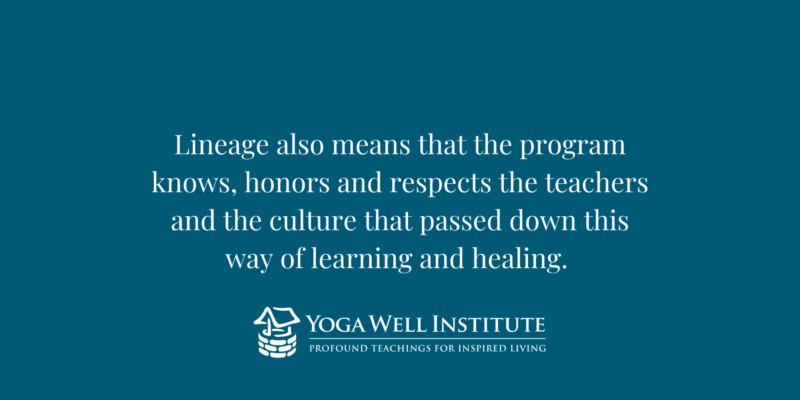Considering deepening your Yoga training? Here’s 6 tips for choosing a Yoga Therapist Training Program that will truly prepare you for your new career.
1. Does the program teach from an authentic Eastern perspective?
Yoga has incredibly useful models for understanding the human system and they are Indian in origin. These models are different from what you think when you hear anatomy and physiology! Breathing, chanting, listening skills, meditation, lifestyle and diet look different through the lens of Yoga, and you’ll be grateful to have a training rooted in an authentic Eastern perspective. Learn more about the Eastern anatomies here.
2. What is the lineage of the program?

Some programs draw from disparate theories about fascia, trauma, neuroscience, and types of Yoga. Any of these can be helpful enrichment, but if they form the core curriculum of your program, then you may end up more confused than prepared. When a program teaches from a lineage then the many facets of Yoga Therapy theory and practice all stem from the same sturdy vine. The principles are coherent and cohesive. Lineage also means that the program knows, honors and respects the teachers and the culture that passed down this way of learning and healing. There’s deep respect for the peoples who made the work we do today possible. You can learn more about the Viniyoga lineage that Yoga Well Institute teaches from here.
3. Will you have a Mentor and how will they be supporting you?
In some programs, you may find a heavy emphasis on “group mentoring” or a mentor who is really more of an academic advisor.
This is not what we mean when we say Mentor at the Yoga Well Institute. Throughout the course of our Yoga Therapy Program, students meet regularly, one-to-one with their Mentors to receive individualized Yoga Therapy themselves, as well as ongoing supervision and professional support in practicum and beyond.
As a Yoga Therapist, you’ll be working one-on-one with your clients and asking them to do a practice at home to help them heal. You need to have experience receiving one-on-one Yoga Therapy and see what personal practice can do in your life! Your time with your Mentor is where you can be on the receiving end of this healing relationship, and get individualized support building your Yoga Therapy practice. Your Mentor helps you navigate the joys and the challenges of your new career in a way that makes sense to you. The mentorship component of your training is also where you’ll get help and supervision applying Yoga to your clients. Click here to get matched with a Mentor.
4. Does the cost of the program reflect the quality of education?
The cost of programs vary wildly, but don’t be wooed by a low ticket price and sleek marketing. The best programs often cost a lot more than their competition because they are committed to the quality of your training. Look for a mix of in person and online training modules, and a schedule with regular contact with faculty and mentors as well as opportunities to practice things like meditation, chanting, āsana course planning and Yogasūtra studies. Remember, these take time, resources, and are incredibly valuable when you go to set yourself apart in the market. Real integration happens with regular, repeated contact with the material over a long period of time. Notice the training programs that have weekly classes for you to attend so your learning isn’t limited to module weekends, or worse two 10 day modules a year. You’ll probably be paying more, but the return on your investment is worth it.
Many programs want their offerings to be accessible and offer financial aid or scholarships. If the program you’re considering is out of your price range, inquire about deadlines to apply for financial aid and scholarship opportunities.
5. Can you try on the school before you dive in?
If you’ve never taken a class with the faculty or in the lineage you are considering, look for an opportunity to take a workshop or a long term class. This is helpful for you to get a feel for the program before you commit yourself to a Yoga Therapist Training! If the program doesn’t offer any sort of workshop or learning opportunity outside of the therapist training, proceed with caution. You want to have a learning institute that is more than a teacher factory trying to make a buck.
Explore the Yoga Well Institute learning opportunities outside of Yoga Therapist Training Programs, here.
You can also tune into the Yoga Well Podcast HERE to learn more about our institute, teachings and experiences.
6. Will you become certified upon completion?
If your goal is professional development, you will want to select a program that is accredited!
The Yoga Well Institute is accredited by the International Association of Yoga Therapists (IAYT).
Students who meet graduation requirements and complete the Program and Practicum can apply to become Certified IAYT. Most students in a Yoga Therapist training program will already have 200 – 500 hours RYT.
Learn more about what Yoga Therapy is HERE and find a Yoga Therapist near you.

Amanda Green
C-IAYT
Amanda Green is a graduate of the YATNA yoga therapy program (2017) and an IAYT-certified yoga therapist. Amanda is faculty at Yoga Well Institute where she teaches and mentors future yoga therapists, and she offers individual yoga therapy through her practice in Austin, TX and online.



